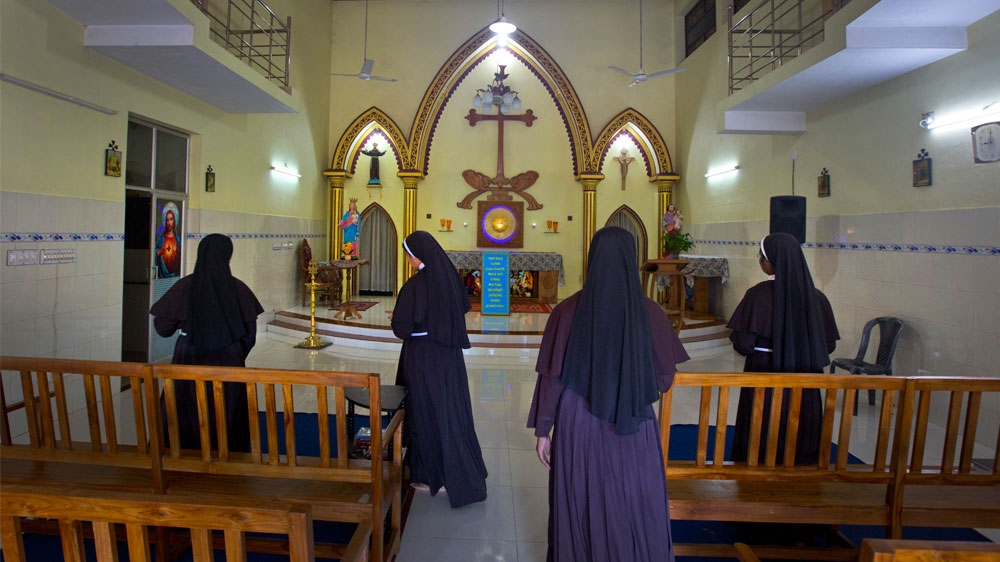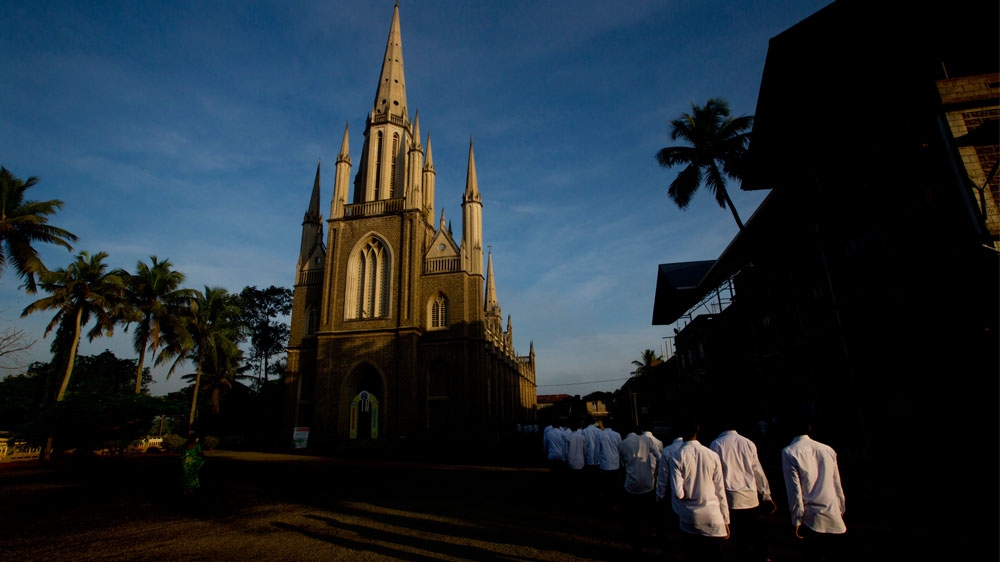India’s hidden years of nuns sexually abused by priests
The stories spill out in the sitting rooms of Catholic convents, where portraits of Jesus keep watch and fans spin quietly overhead.
They spill out in church meeting halls bathed in fluorescent lights, and over cups of cheap instant coffee in convent kitchens. Always, the stories come haltingly, quietly. Sometimes, the nuns speak at little more than a whisper.
Across India, the nuns talk of priests who pushed into their bedrooms and of priests who pressured them to turn close friendships into sex. They talk about being groped and kissed, of hands pressed against them by men they were raised to believe were representatives of Jesus Christ.
“He was drunk,” said one nun, beginning her story. “You don’t know how to say no,” said another.
At its most grim, the nuns speak of repeated rapes, and of a Catholic hierarchy that did little to protect them.
The Vatican has long been aware of nuns sexually abused by priests and bishops in Asia, Europe, South America and Africa, but it has done very little to stop it.
Now, the Associated Press news agency has investigated the situation in a single country – India – and uncovered a decades-long history of nuns enduring sexual abuse from within the church.
Nuns described in detail the sexual pressure they endured from priests, and nearly two dozen other people – nuns, former nuns and priests, and others – said they had direct knowledge of such incidents.
Still, the scale of the problem in India remains unclear, cloaked by a powerful culture of silence. Many nuns believe abuse is commonplace, insisting most sisters can at least tell of fending off a priest’s sexual advances.
 |
| Nuns have described in detail the sexual pressure they endured from priests [Manish Swarup/AP] |
Last year, when repeated complaints to church officials brought no response, a 44-year-old nun filed a police complaint against the bishop who oversees her religious order, accusing him of raping her 13 times over two years.
Soon after, a group of her fellow nuns launched a two-week public protest in India’s Catholic heartland, demanding the bishop’s arrest.
It was an unprecedented action, dividing India’s Catholic community. Inside the accuser’s convent in rural Kerala state, she and the nuns who support her are now pariahs, isolated from the other sisters, many of whom insist the bishop is innocent. The protesting nuns get hate mail and avoid going out.
“Some people are accusing us of working against the church, of being against the church. They say, ‘You are worshipping Satan,'” said one supporter, Sister Josephine Villoonnickal. “But we need to stand up for the truth.”
‘Terrifying experience’
Some nuns’ accounts date back to decades – like that of the sister, barely out of her teens, who was teaching in a Catholic school in the early 1990s.
The priest was in his 60s. She was four decades younger.
One night, the priest went to a neighbourhood party. He came back late, after 9:30 pm, and knocked at her room.
“I need to meet you,” he said, insisting he wanted to discuss her spiritual life. She could smell the alcohol.
“You’re not stable. I’m not ready to meet you,” she told him.
But the priest forced open the door. He tried to kiss her. He grabbed at her body, groping wherever he could.
Weeping, she pushed him back enough to slam the door and lock it.
“It was such a terrifying experience.”
She told her mother superior, who allowed her to avoid other meetings with the priest. She also wrote an anonymous letter to church officials, which she thinks may have led to the priest being reassigned.
But nothing was said aloud. There were no public reprimands, no warnings to the many nuns the priest would work with through his long career.
She was too afraid to challenge him openly. “I couldn’t imagine taking that stand. It was too scary,” she said. “For me, it was risking my own vocation.”
So the fierce nun remained silent.
Sexual taboo
Catholic history is filled with women who became martyrs to their own purity: Saint Agatha had her breasts torn off for refusing to marry; Saint Lucy was burned alive and stabbed in the throat for defending her virginity; Saint Maria Goretti was 11 years old when she was killed by a man who tried to rape her.
“It is a sin!” Maria is said to have cried out. “God does not want it!”
But for a nun, fighting off a priest’s advances means pinballing through centuries-old sexual and clerical traditions.
Celibacy is a cornerstone of Catholic religious life, as is sexual purity among nuns. Many nuns say a sister who admits to a sexual experience – even if it’s forced – faces the risk of isolation within her order, and possibly even expulsion.
“You’re not sure if you’ll be kept in your congregation, because so much is about your vow of chastity,” said Sister Shalini Mulackal, a New Delhi-based theologian. “That fear is there for the young ones to disclose what has happened to them.”
At the same time, priests are seen as living representatives of Christ, with obedience to them another Catholic cornerstone.
Caught at this intersection of sexual taboo, Catholic hierarchy and loneliness, sisters can be left at the mercy of predatory priests.
“There’s a lot of emotion bottled up and when a little tenderness is shown by somebody it can be so easy for you to cross boundaries,” said Sister Dorothy Fernandes, who has spent years working with the urban poor in eastern India. “It can be hard to tell what is love and what is exploitation.”
 |
| Celibacy is a cornerstone of Catholic religious life, as is sexual purity among nuns [Manish Swarup/AP] |
A nun from Kerala state remembers the misery of Sunday mass as an adolescent, when boys would stand outside the church to watch girls filing in, eyes crawling over their young figures. “We have a terrible taboo about sex.”
That naivety, she said, can be costly.
Like the time she was a novice nun, still in her teens, and an older priest came to the Catholic centre where she worked. He was from Goa, a coastal region and former Portuguese colony.
She shook her head: “I was in charge of visitors, and we had this bad habit of being hospitable.”
At one point, she brought the priest’s laundry to his small room, where he was sitting. As she set down the clothes, he grabbed her and began to kiss her.
At first, she had no idea what was happening.
“The kissing was all coming here,” she said, gesturing at her chest.
She quietly told a senior nun to not send novices to the priest’s room. But, like the nun who fought the drunken priest, she made no official complaint.
Risk of speaking up
A complaint against a priest means getting pulled into a tangle of malicious rumours and church politics. It means risking your reputation and the reputation of your order.
Archbishop Kuriakose Bharanikulangara, a New Delhi-based church leader, calls incidents of abuse “kind of sporadic”. “Once here, once there.”
But “many people don’t want to talk”, he continued. “They may talk in the community, but they don’t want to bring it to the public, to the court.”
There are roughly 18 million Catholics in India, but that’s a small minority in this largely Hindu nation of 1.3 billion. Speaking up could tarnish the image of their church, many nuns worry, and feed criticism by Hindu hardliners.
“Even we, as religious sisters, even we try to keep it quiet,” said Mulackal, the theologian. “A woman who goes through this experience, she just wants to hide it and pretend everything is OK.”
A woman who goes through this experience, she just wants to hide it and pretend everything is OK.
Sister Shalini Mulackal, theologian
The rapes, the nun from Kerala says, happened in room number 20 of a small convent at the end of a one-lane road. The rapist, she says, was the most powerful man in this tiny small world: Bishop Franco Mulakkal.
Smart and ambitious, Mulakkal had risen from small-town Kerala to become a bishop in north India.
The nun is a friendly woman with jet black hair known for her quiet confidence. Every few months, she says, Mulakkal would visit the St Francis convent and summon her. Then, according to a letter she wrote to church officials, he raped her.
The letter says the first rape happened on May 5, 2014. The last time was September 23, 2016. The dates are recorded in the convent’s visitor logs.
Mulakkal angrily denies the accusations, telling reporters the charges were “baseless and concocted” and accusing the sister of trying to blackmail him into giving her a better job.
“I am going through painful agony,” said Mulakkal, who was jailed for three weeks and released on bail in October. “I tell everyone to pray to God: Let the truth prevail.”
‘Survivor sister’
Many see Mulakkal as a victim. A string of supporters visited him in jail, and crowds greeted him when he was released on bail. “Hearty Welcome!” a banner proclaimed.
But at the St Francis convent, one group of nuns watched news reports about that welcome with dismay. While the sister levelling the accusations against Mulakkal does not speak publicly, a half-dozen nuns cluster around her, offering support and speaking on her behalf.
 |
| Sister Josephine Villoonnickal, left, sister Alphy Pallasseril, centre, and Sister Anupama Kelamangalathu, have supported the accusation of rape against Bishop Franco Mulakkal [Manish Swarup/AP] |
“Nobody came to see sister, but so many people came to wait in line to meet Bishop Franco in jail,” said Villoonnickal, the nun who moved back to Kerala to support the woman she calls “our survivor sister”.
It was about fear.
“The bishop is such a powerful person and standing against him, where will she go?” asked Villoonnickal. “If she went home, what will happen to her?”
“Many times, she was telling him to stop. But each time he was forcing himself on her,” she continued.
Eventually, they say, she told some sisters what was happening. Then she says she repeatedly complained to church authorities. When nothing happened, she went to the police.
Catholic authorities have said little about the case, with India’s Catholic Bishops’ Conference saying in an October statement that it has no jurisdiction over individual bishops, and that the investigation and court case, which could take many years, must run their course.
Fear of isolation
In Malayalam, the language of Kerala, sisters who leave the convent are sometimes marked as “Madhilu Chadi” – Wall Jumpers. It’s a mocking term for the sexually frustrated and is often used for nuns and priests who have fled religious life.
Those who stay, get respect. Those who leave, often find themselves adrift, searching for new identities and spurned by families and friends.
Speaking up about the church’s troubles, many nuns say, could end with them forced from their convents, cut off in many ways from what they’ve always known.
“It’s a fear of being isolated if I speak the truth,” said the nun who fought off the drunken priest. “If you do that, you have to go against your own community, your own religious superiors.”
In the end, most say nothing.
“I didn’t tell anybody,” said the nun who escaped the priest kissing her chest, and who waited many years to talk about what had happened to her. “So you understand how these things are covered up.”




